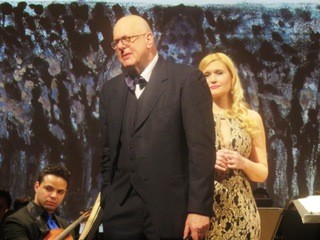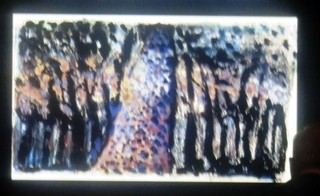|
Back
New York
Grace Rainey Auditorium, The Metropolitan Museum of Art
12/03/2017 -
“Sight And Sound: Schoenberg, Munch & Expressionism”:
Arnold Schoenberg: Erwartung (“Expectation”), Opus 17
Kirsten Chambers (Soprano)
The Orchestra Now (TŌN), Leon Botstein (Founder, Conductor and Interlocutor)

L. Botstein, C. Chambers (© Samuel A. Dog)
“Violent Night,
Bats Should Take Flight...”
Traditional Christmas song (Revised)
No, Arnold Schoenberg’s monodrama, Erwartung is hardly your traditional Christmas fare (though the dark forest recollects the Grimm Brothers’ Hansel and Gretel). But Leon Botstein did present the full-house audience at the Met Museum yesterday afternoon with a most welcome gift.
Specifically the words of Leon Botstein.
Programs of his young player ensemble, The Orchestra Now (TŌN), have eschewed Mr. Botstein’s exegeses of the music, a venal sin, more than omission. For Mr. Botstein’s is not simply a peripatetic erudition, it is his gift of tying together histories, music, personalities, paintings, trends and the entire zeitgeist of the works to be played.
This, above anything else, sets him aside, benefits otherwise passive audiences and probably energizes his musicians as well.
Yesterday, he offered this introduction with musical excerpts, of perhaps the most original dramatic work of the 20th Century. Wozzeck, Lulu and Rake are astonishing operas, but this 1909 monodrama plunges us into the inner depths, of a soul, into a torment above words, into a musical hallucination. Those who have studied early Schoenberg might have understood this pre-dodecaphonic work. But Mr. Botstein’s introduction gave us the background–almost complete–the musical tools, the history, and (if possible, for an a-thematic 30 minutes) a way to understand the work itself.
With utmost precision, Mr. Botstein explained the Expressionistic art movement in Germany (The French had “only” Impressionism and surrealism). He used the word “emancipate” repeatedly. First in relation to the freedom of painting from “realism” and “idealism” to reflect the artist’s own point of view. And then, the “emancipation” of tonality for Arnold Schoenberg, his feeling that the tone center was an imprisonment.
After that, Mr. Botstein so wisely went into the musical pattern of Erwartung, its meaning for orchestral color, for soprano, for the poem written by Schoenberg by the fascinating Marie Pappenheim, whose biography he related. And above all, for the emotional picture of the singer as she finds–supposedly–the body of her lover.
To conclude, Mr. Botstein showed the remarkable paintings of Schoenberg. I had seen his self-portraits, but had no idea how deft an artist he was, how much he had in common with Edvard Munch (also shown) and how Schoenberg’s massive ego created a whole series of self-portraits, not the single portrait.
One extremely unhappy omission in Mr. Botstein’s superb presentation was the explanation which Schoenberg himself had of Erwartung. In his essay about his operas, he says, “the aim is to show in slow motion (italics from the composer) everything that occurs during a single second (italics mine) of maximum spiritual excitement, stretching it out to half an hour.”
Would this have changed the attitude of yesterday’s audience to the monodrama? It might have only confused them.
(Though this was very much part of Schoenberg’s aesthetics. When asked how long it took him to compose Moses und Aron, he replied, “It took only a single second. But it took me five years to write down all the notes.”)
That first half of the performance was so illuminating that I felt the performance might have been disappointing. But I was absolutely wrong. Soprano Kirsten Chambers has made her reputation as Salome, and while I have never seen her in the role, she gave such passion, such dramatic excitement to the role here, that one could easily see her as the crazed Strauss heroine.

A Schoenberg’s painting of Erwartung background (© Public property)
Arnold Schoenberg wanted Erwartung to be staged, and all we had here was his original background forest. But Ms. Chambers, besides essaying the so taxing role, beautifully enunciated and phrased, gave totally of her hands, her body, her eyes.
Her voice, utterly beautiful, might not have had the Wagnerian heaviness for the role–but this itself gave the part the vulnerability so essential to the role. Plus, she gave, in other words, all the drama necessary for the piece to have its ultimate strength.
How did Mr. Botstein’s orchestra do? I didn’t bring the score of Erwartung, and perhaps they weren’t quite on target for the excitement which rivaled Ms. Chambers. But I certainly didn’t notice it. They seemed spot on and during the percussive tuttis, The Orchestra Now gave forth a resonance which shook the rafters.
After, Mr. Botstein answered a few questions from the audience, with humor and knowledge. and edification. Yet this was almost an anti-climax. For this listener, at least, he had offered far more than a mere “rationale” or “appreciation” for the difficult work. He had given it scope, sympathy and an all-embracing understanding.
Harry Rolnick
|